Instead of affirming the idea that husbands and wives cooperate to raise a child, this commercial affirms the idea that women nurture their children alone. Her husband is not her partner; he is just another human in the home whom she is responsible for nurturing. Women, then, are mothers and wives whose sole job is to nurture children and husbands. Accordingly, the husband and the child are, inevitably, pitted against one another.
gender: masculinity
When considering which media text I wanted to analyze based on its ideology, I immediately thought about the unsettling yet intriguing relationship between the main characters in one of my favorite TV shows of all time: Mulder and Scully from The X-Files. About a year ago, I began watching the show when a friend bought the entire series on DVD. Despite the fact that I absolutely loved almost every episode, the story arc of these two main characters as co-workers and a couple reinforces tired gender roles.
The below clip is a climactic scene where Mulder and Scully argue about Scully leaving the X-Files in the 1998 film “The X-Files: Fight the Future.” I think this scene exemplifies their basic relationship, and is a good example of what I would like to analyze.
[youtube]https://youtu.be/esJNnh-d2E0[/youtube]
What I like about Scully is that she is intelligent, scientific, and witty. She joins up with Mulder to be the counterpart to his obsessive interest in the paranormal. Since Scully is the fact-spouting hard ass of the two, one might think the character is breaking stereotypes. Unfortunately, she is only obscuring them.
Scully plays a traditional mother figure to Mulder more so than his love interest. She continually questions her work in the FBI duo, but she stays because Mulder needs her. In her, he has found someone who tries to understand his work, someone to care for him, and someone to love him unconditionally. The few times that she has an interest in other men is when she is trying to get over Mulder or get back at him.
Throughout the series, the fact that Mulder is a “typical bachelor” is driven home. He’s quirky and boyish. He never cooks, he’s obsessed with baseball and porn, he can’t keep house, and he usually just sleeps on his couch. Scully is seemingly unconcerned by all this. She laughs it off when he flirts with other women, she rolls her eyes at his housekeeping, and she is always there whenever Mulder decides he needs her.
The video above is an example of a sort of backwards rationale. Yes Mulder is thanking Scully for being there for him, but he’s also pleading with her to continue to deprive her own happiness. Though the scene directly references her giving up her own interests to be with him, it also romanticizes the concept of a woman selflessly caring for her man. The scene resonates with his emotional “thank you” and begs the viewer and Scully to come to his rescue. It reinforces the idea that in order for a woman to be perfect for a man, she must be willing to do anything for him at all costs and should never as for anything in return. If he so much as thanks her for years of servitude, then he’s the knight in shining armor. Read it as: The perfect women are level-headed and enjoy cleaning up the messes that their boy-in-a-man’s-body significant others create without any appreciation.
I think the X-Files is a good example of a show that manages to skirt the issue of gender roles by throwing a few curve balls. In reality though, it’s just more of the same.
————————–
Sarah Mick is a student at the University of Wisconsin – Milwaukee. She is currently double majoring in graphic design and media studies. She enjoys playing music, writing, and consuming media of various sorts in her spare time. I found her post here, where students in a Principles of Media Studies class are posting their insights. Special thanks to the instructor, Michael Newman, for facilitating the blog and allowing all of us to enjoy it!
If you would like to write a post for Sociological Images, please see our Guidelines for Guest Bloggers.
Lisa Wade, PhD is an Associate Professor at Tulane University. She is the author of American Hookup, a book about college sexual culture; a textbook about gender; and a forthcoming introductory text: Terrible Magnificent Sociology. You can follow her on Twitter and Instagram.
Here is an ad from the “Most Interesting Man in the World” ad campaign by Dos Equis:
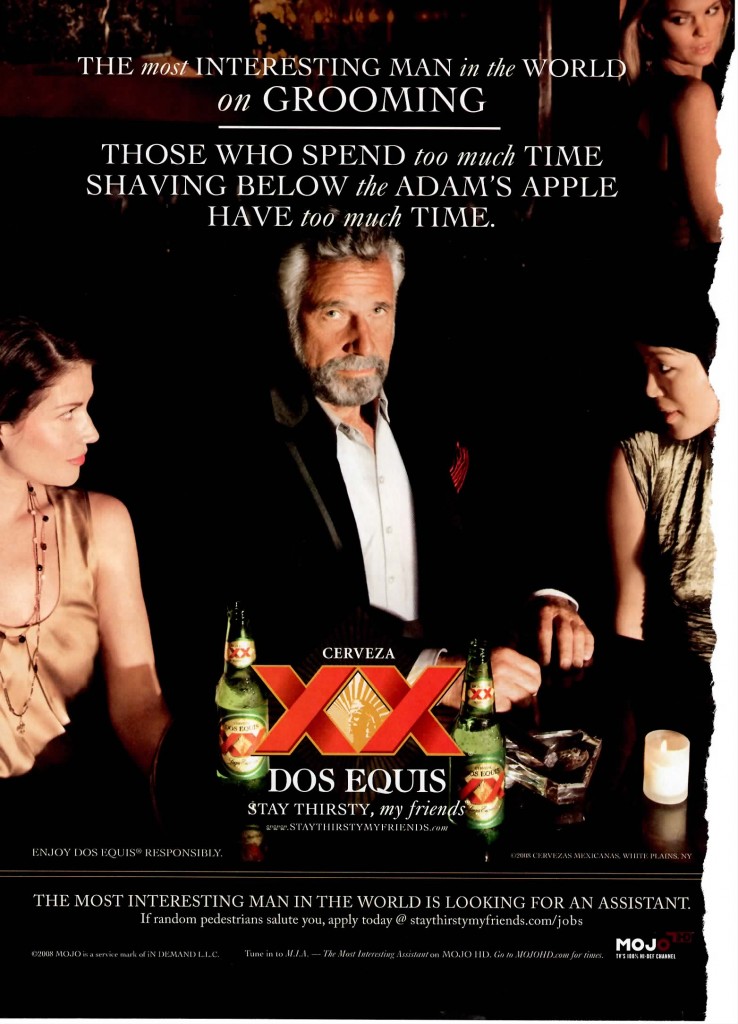
This ad, which is a clear attempt to harken back to the halcyon days of unfettered masculinity, is a cautionary tale against the feminizing effect of men shaving their body hair. Contrast this message with that of the following ad for the Schick Quattro:

Since the razor is pink, we can safely assume that it’s intended for women to use when converting their spiky brambles into beautiful flowers.
So, men aren’t supposed to shave below the neck, but women are required to. Specifically, women are supposed to shave their “flowers” (in a nod to vulva-as-flower imagery?).
This may be helpful in discussions about social norms related to the removal of pubic hair. Of particular interest is whether the expectation of women’s pubic hair removal is objectively different from the expectation that they will remove other body hair. Although pubic hair is considered more “private,” it’s difficult to make the argument that the impact of removing it is more sexual than that of, say, removing armpit hair (given that women’s attractiveness is partially predicated on the illusion of hairlessness). Also, some men are beginning to remove their pubic hair (and the Most Interesting Man in the World be damned). Is this a positive shift, suggesting some parity in beauty standards, or is it a negative shift, in that superficial cosmetic norms now have the power to leapfrog over the traditional bastion of masculinity?
Katie M. sent in a link to a post at Vast Public Indifference about gender in Pixar films, specifically how they tend to focus on male characters, with female characters in smaller or supporting roles. As Caitlin says in the original post,
The Pixar M.O. is (somewhat) subtler than the old your-stepmom-is-a-witch tropes of Disney past. Instead, Pixar’s continued failure to posit female characters as the central protagonists in their stories contributes to the idea that male is neutral and female is particular. This is not to say that Pixar does not write female characters. What I am taking issue with is the ad-nauseam repetition of female characters as helpers, love interests, and moral compasses to the male characters whose problems, feelings, and desires drive the narratives.
Here are some images showing main characters from a number of Pixar films. Clearly there are a lot I left out; I chose these both because they were mentioned in the original post by Caitlin, because I’ve seen them, and because they illustrate the general trend.
From “Cars,” a movie in which almost all the characters are male and female characters are mostly car-groupies who swoon over the main character (though there is a female attorney car who doesn’t fall into that category):
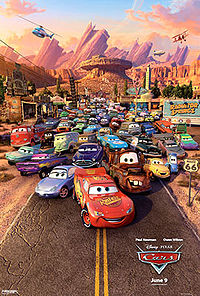
“Monsters, Inc.,” where the two central characters are male:
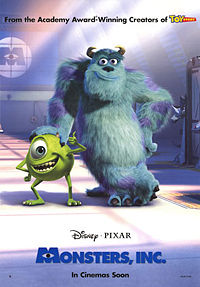
“Toy Story,” same as above:
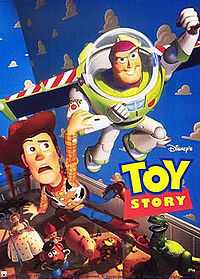
“A Bug’s Life,” in which not only is the main character male, the actual behaviors of male and female ants have been switched to fit in with our ideas of appropriate gender roles (for another example of changing the behavior of animals to fit human gender norms, see this post on “Bee Movie”):
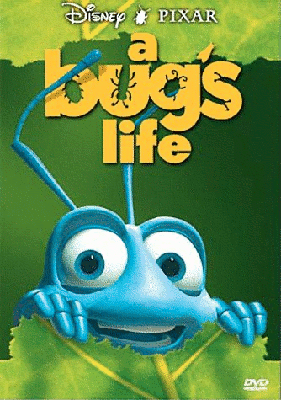
We do see a Pixar film with a female main character, however: the upcoming”The Bear and the Bow”:
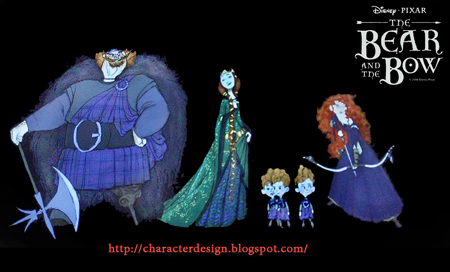
According to Wikipedia, this is Pixar’s “first fairy tale.” So apparently though we get a female lead here, she’s of the spunky-princess type often found in fairy tales.
I have read, in discussions of gender in children’s films, that there is a general belief in the industry that everyone will watch a movie with a male lead character, but boys will be turned off by movies with a female lead. So we see the pattern Caitlin points out: males are the neutral category that are used when the movie is meant to appeal to a broad audience, while females get the lead mostly when the movie is specifically geared toward girls. The assumption here is that girls learn to look at the world through the male gaze (identifying with and liking the male lead, even though he’s male), while boys aren’t socialized to identify with female characters (or actual girls/women) in a similar manner.
I’m torn as to whether I think boys would avoid movies that had female leads. On the one hand, a big part of masculinity is rejecting all things feminine, so I can imagine boys deciding they hated any movie that seemed to be for or about girls. On the other hand, I wonder what would happen if we had more films aimed at kids that had female leads but didn’t fall into the traditional “girl’s movie” categories (such as fairy tales). If “A Bug’s Life” had a female lead but was otherwise the same type of movie–one aimed at a general audience, not specifically girls–would boys reject it? Most of the animated movies I can think of that had females as the main character were focused around romance and other topics deemed feminine (except maybe “Mulan,” where that’s not the main focus), which obscures the issue of whether boys would watch a movie with a female character if it was treated as a general-audience movie. [Note: See the comments for some other examples of movies with female leads that weren’t necessarily romantic-centered, such as “Lilo & Stitch” and “Alice in Wonderland,” as well as some non-animated ones.]
I dunno. Thoughts?
UPDATE: In the comments, Benjamin L. makes a great point:
Something to consider is that most of the people working on Pixar films are men. It’s possible that they might feel unable to successfully create and write dialog for compelling female characters. Take a look at this list: http://en.wikipedia.org/wiki/List_of_Pixar_films Out of the all the writers and directors of Pixar’s films, one is female–Rita Hsiao. Significantly, the films she has worked on, Mulan and Toy Story 2, are unique in that they both have prominent female characters.
Anna sent in a link to Courage beer’s “take courage” ad campaign, in which men are shown in various situations where they are told to”take courage” in the face of a proctology exam, ugly sweater, and the following:
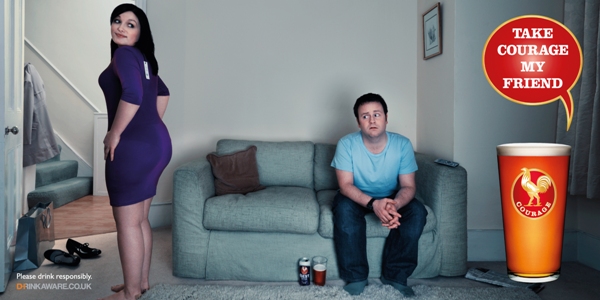
Both Anna and I are a little confused by this one. What’s he supposed to be needing courage for, exactly? Is it that his girlfriend is asking if her butt looks big? Or that she thinks she looks good and he’ll have to be seen with her dressed like that? When I first glanced at it I thought it was her thinking she looked good and him being grossed out, but when I looked closer, I think it’s the “does my butt look big?” scenario. Is he supposed to take courage and lie, or take courage and tell the truth?
Notice how the ad uses a not-super-skinny woman in it, but ridicules how she looks. Clearly the answer to “does my butt look big in this?” is supposed to be “yes,” and we’re supposed to find her laughable in that outfit. What I’m not quite sure about is whether she’s being presented as inherently laughable, or as a woman who is attractive and it’s only the dress that makes her unappealing. Thoughts?
Anna was also interested in how the ad portrays relationships between men and women. For some reason it reminds me a little of the last video in this post of Errol Morris Miller beer commercials, in which men clearly find women trivial and annoying.
UPDATE: In a comment, Christian suggests, “It’s about him drinking her beautiful. Get a Courage and you get over it (the butt) or her attitude “does my butt look big?”.”
And Trevira adds,
I think this ad directly refers to the ‘insecure woman’ character played by Arabella Weir in the popular UK tv sketch show ‘The Fast Show.’ The character’s catchphrase was ‘does my bum look big in this?’ (Weir even ended up writing a novel with the same title!).
So there may be a cultural reference here that escapes us non-Brits.
Chicho sent in a link to an interesting ad campaign from the Agency for Healthcare Research and Quality and the Ad Council. The campaign’s tagline is Real Men Wear Gowns:
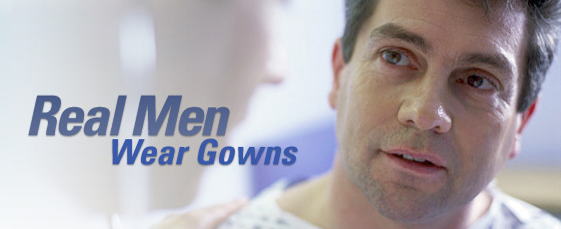
According to the website, “Real Men Know the Facts” about heart disease.”
As Chicho points out, it’s one of those rare examples we see of ads trying to undermine stereotypical masculinity rather than play it up: there’s still the idea of being a “real man,” but instead of associating that with rugged individualism or risk-taking (or eating high-fat bacon burgers while drinking a beer as you sit in your Dodge truck), here being a real man means taking care of yourself, going to the doctor regularly, and taking care of your family by staying healthy.
Thanks, Chicho!
Gwen Sharp is an associate professor of sociology at Nevada State College. You can follow her on Twitter at @gwensharpnv.
Will M. sent us this fascinating clip of Lil’ Wayne on Jimmy Kimmel Live. In the clip, Kimmel asks Wayne about losing his virginity at age 11. Wayne reveals that he did, indeed, lose his virginity at 11. He lost it to a 14-year-old girl who turned out the lights and surprised Wayne into participating, even as he had not intended doing so. What is fascinating is, were Wayne a white female, this narrative would have been considered molestation or rape. As a black male, doubly hypersexualized as a man (who always wants sex) and a black man (who really always wants sex), it’s just considered a joke. This is really nice evidence of the social construction of men, especially Black and Latino men, as hypersexual and, therefore, incapable of being sexually assaulted.
The discussion of his virginity loss begins at about 2:40.
Just one excerpt:
White guy: I didn’t know you could lose your viriginity at 11-years-old.
Other white guy: Well, we can’t, but he did.
From the website: “Project E-MANcipate is a project to accelerate the acceptance of male pantyhose as a regular clothing item.”

Hey, I’m all for men and women wearing pantyhose if they want to (as long as no one makes me wear any) but what sort of “emancipation” is being advocated?
Is this about emancipation men from the confines of masculinity so that they can wear an item associated with femininity?
“Men who wear pantyhose do it to improve athletic performance, energize and revitalize tired, aching leg muscles, and to stimulate circulation if they sit all day. In addition, compression can help reduce swelling and decrease the dangers of circulatory problems. And of course there are many men who simply like the soft material and the comfort that sheer pantyhose provides.”
So men would mostly wear pantyhose for (manly) athletic reasons. And, as the website also notes, to keep warm in the winter. But, some men might just like “the soft material.” What about them?
Or maybe the point is to emancipate pantyhose from being associated with only femininity?
“Since pantyhose (or tights), as a garment, has about it nothing gender-specific (such as a panty that fits only the female body, or a bra that is ‘organ-specific’), there is no reason why people of either sex should think of it as a female-only piece of clothing in everyday life.”
But, as the website points out, it’s important for guys to wear pantyhose in a way that doesn’t look “femmy”– “even hosiery that is thought to be very femmy could go together with an average outfit without making the whole outfit femmy at all.”

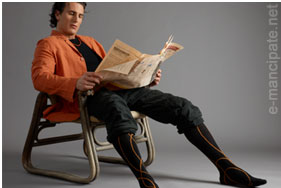
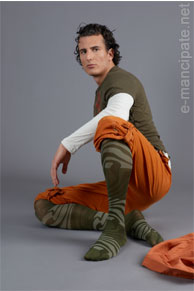
So how about pink pantyhose? Is pink too “femmy” for men?
The conclusion: “White pantyhose with floral patterns [as opposed to plain pink tights] makes you look like a man.”
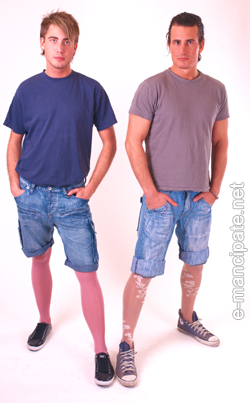
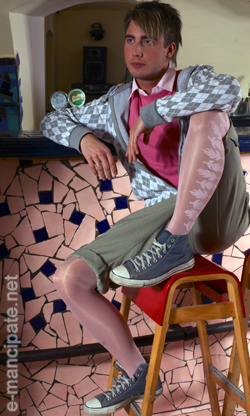 These images would be great for a class discussion on the reappropriation of gendered clothing items. What makes pantyhose specifically “manly” or “femmy”? Does this “e-MANcipation” reify the same old ideas about masculinity and femininity, or challenge and expand them?
These images would be great for a class discussion on the reappropriation of gendered clothing items. What makes pantyhose specifically “manly” or “femmy”? Does this “e-MANcipation” reify the same old ideas about masculinity and femininity, or challenge and expand them?
And I think it’s interesting that this website is U.K.-based. (UPDATE: The company is actually Hungarian– thanks to commenter “bozeman” for the clarification!) I have a hard time imagining a project like this in the U.S. How are ideas about what constitutes a “manly man” different from country to country?
When considering which media text I wanted to analyze based on its ideology, I immediately thought about the unsettling yet intriguing relationship between the main characters in one of my favorite TV shows of all time: Mulder and Scully from The X-Files. About a year ago, I began watching the show when a friend bought the entire series on DVD. Despite the fact that I absolutely loved almost every episode, the story arc of these two main characters as co-workers and a couple reinforces tired gender roles.
The below clip is a climactic scene where Mulder and Scully argue about Scully leaving the X-Files in the 1998 film “The X-Files: Fight the Future.” I think this scene exemplifies their basic relationship, and is a good example of what I would like to analyze.
[youtube]https://youtu.be/esJNnh-d2E0[/youtube]
What I like about Scully is that she is intelligent, scientific, and witty. She joins up with Mulder to be the counterpart to his obsessive interest in the paranormal. Since Scully is the fact-spouting hard ass of the two, one might think the character is breaking stereotypes. Unfortunately, she is only obscuring them.
Scully plays a traditional mother figure to Mulder more so than his love interest. She continually questions her work in the FBI duo, but she stays because Mulder needs her. In her, he has found someone who tries to understand his work, someone to care for him, and someone to love him unconditionally. The few times that she has an interest in other men is when she is trying to get over Mulder or get back at him.
Throughout the series, the fact that Mulder is a “typical bachelor” is driven home. He’s quirky and boyish. He never cooks, he’s obsessed with baseball and porn, he can’t keep house, and he usually just sleeps on his couch. Scully is seemingly unconcerned by all this. She laughs it off when he flirts with other women, she rolls her eyes at his housekeeping, and she is always there whenever Mulder decides he needs her.
The video above is an example of a sort of backwards rationale. Yes Mulder is thanking Scully for being there for him, but he’s also pleading with her to continue to deprive her own happiness. Though the scene directly references her giving up her own interests to be with him, it also romanticizes the concept of a woman selflessly caring for her man. The scene resonates with his emotional “thank you” and begs the viewer and Scully to come to his rescue. It reinforces the idea that in order for a woman to be perfect for a man, she must be willing to do anything for him at all costs and should never as for anything in return. If he so much as thanks her for years of servitude, then he’s the knight in shining armor. Read it as: The perfect women are level-headed and enjoy cleaning up the messes that their boy-in-a-man’s-body significant others create without any appreciation.
I think the X-Files is a good example of a show that manages to skirt the issue of gender roles by throwing a few curve balls. In reality though, it’s just more of the same.
————————–
Sarah Mick is a student at the University of Wisconsin – Milwaukee. She is currently double majoring in graphic design and media studies. She enjoys playing music, writing, and consuming media of various sorts in her spare time. I found her post here, where students in a Principles of Media Studies class are posting their insights. Special thanks to the instructor, Michael Newman, for facilitating the blog and allowing all of us to enjoy it!
If you would like to write a post for Sociological Images, please see our Guidelines for Guest Bloggers.
Lisa Wade, PhD is an Associate Professor at Tulane University. She is the author of American Hookup, a book about college sexual culture; a textbook about gender; and a forthcoming introductory text: Terrible Magnificent Sociology. You can follow her on Twitter and Instagram.
Here is an ad from the “Most Interesting Man in the World” ad campaign by Dos Equis:

This ad, which is a clear attempt to harken back to the halcyon days of unfettered masculinity, is a cautionary tale against the feminizing effect of men shaving their body hair. Contrast this message with that of the following ad for the Schick Quattro:

Since the razor is pink, we can safely assume that it’s intended for women to use when converting their spiky brambles into beautiful flowers.
So, men aren’t supposed to shave below the neck, but women are required to. Specifically, women are supposed to shave their “flowers” (in a nod to vulva-as-flower imagery?).
This may be helpful in discussions about social norms related to the removal of pubic hair. Of particular interest is whether the expectation of women’s pubic hair removal is objectively different from the expectation that they will remove other body hair. Although pubic hair is considered more “private,” it’s difficult to make the argument that the impact of removing it is more sexual than that of, say, removing armpit hair (given that women’s attractiveness is partially predicated on the illusion of hairlessness). Also, some men are beginning to remove their pubic hair (and the Most Interesting Man in the World be damned). Is this a positive shift, suggesting some parity in beauty standards, or is it a negative shift, in that superficial cosmetic norms now have the power to leapfrog over the traditional bastion of masculinity?
Katie M. sent in a link to a post at Vast Public Indifference about gender in Pixar films, specifically how they tend to focus on male characters, with female characters in smaller or supporting roles. As Caitlin says in the original post,
The Pixar M.O. is (somewhat) subtler than the old your-stepmom-is-a-witch tropes of Disney past. Instead, Pixar’s continued failure to posit female characters as the central protagonists in their stories contributes to the idea that male is neutral and female is particular. This is not to say that Pixar does not write female characters. What I am taking issue with is the ad-nauseam repetition of female characters as helpers, love interests, and moral compasses to the male characters whose problems, feelings, and desires drive the narratives.
Here are some images showing main characters from a number of Pixar films. Clearly there are a lot I left out; I chose these both because they were mentioned in the original post by Caitlin, because I’ve seen them, and because they illustrate the general trend.
From “Cars,” a movie in which almost all the characters are male and female characters are mostly car-groupies who swoon over the main character (though there is a female attorney car who doesn’t fall into that category):

“Monsters, Inc.,” where the two central characters are male:

“Toy Story,” same as above:

“A Bug’s Life,” in which not only is the main character male, the actual behaviors of male and female ants have been switched to fit in with our ideas of appropriate gender roles (for another example of changing the behavior of animals to fit human gender norms, see this post on “Bee Movie”):

We do see a Pixar film with a female main character, however: the upcoming”The Bear and the Bow”:

According to Wikipedia, this is Pixar’s “first fairy tale.” So apparently though we get a female lead here, she’s of the spunky-princess type often found in fairy tales.
I have read, in discussions of gender in children’s films, that there is a general belief in the industry that everyone will watch a movie with a male lead character, but boys will be turned off by movies with a female lead. So we see the pattern Caitlin points out: males are the neutral category that are used when the movie is meant to appeal to a broad audience, while females get the lead mostly when the movie is specifically geared toward girls. The assumption here is that girls learn to look at the world through the male gaze (identifying with and liking the male lead, even though he’s male), while boys aren’t socialized to identify with female characters (or actual girls/women) in a similar manner.
I’m torn as to whether I think boys would avoid movies that had female leads. On the one hand, a big part of masculinity is rejecting all things feminine, so I can imagine boys deciding they hated any movie that seemed to be for or about girls. On the other hand, I wonder what would happen if we had more films aimed at kids that had female leads but didn’t fall into the traditional “girl’s movie” categories (such as fairy tales). If “A Bug’s Life” had a female lead but was otherwise the same type of movie–one aimed at a general audience, not specifically girls–would boys reject it? Most of the animated movies I can think of that had females as the main character were focused around romance and other topics deemed feminine (except maybe “Mulan,” where that’s not the main focus), which obscures the issue of whether boys would watch a movie with a female character if it was treated as a general-audience movie. [Note: See the comments for some other examples of movies with female leads that weren’t necessarily romantic-centered, such as “Lilo & Stitch” and “Alice in Wonderland,” as well as some non-animated ones.]
I dunno. Thoughts?
UPDATE: In the comments, Benjamin L. makes a great point:
Something to consider is that most of the people working on Pixar films are men. It’s possible that they might feel unable to successfully create and write dialog for compelling female characters. Take a look at this list: http://en.wikipedia.org/wiki/List_of_Pixar_films Out of the all the writers and directors of Pixar’s films, one is female–Rita Hsiao. Significantly, the films she has worked on, Mulan and Toy Story 2, are unique in that they both have prominent female characters.
Anna sent in a link to Courage beer’s “take courage” ad campaign, in which men are shown in various situations where they are told to”take courage” in the face of a proctology exam, ugly sweater, and the following:

Both Anna and I are a little confused by this one. What’s he supposed to be needing courage for, exactly? Is it that his girlfriend is asking if her butt looks big? Or that she thinks she looks good and he’ll have to be seen with her dressed like that? When I first glanced at it I thought it was her thinking she looked good and him being grossed out, but when I looked closer, I think it’s the “does my butt look big?” scenario. Is he supposed to take courage and lie, or take courage and tell the truth?
Notice how the ad uses a not-super-skinny woman in it, but ridicules how she looks. Clearly the answer to “does my butt look big in this?” is supposed to be “yes,” and we’re supposed to find her laughable in that outfit. What I’m not quite sure about is whether she’s being presented as inherently laughable, or as a woman who is attractive and it’s only the dress that makes her unappealing. Thoughts?
Anna was also interested in how the ad portrays relationships between men and women. For some reason it reminds me a little of the last video in this post of Errol Morris Miller beer commercials, in which men clearly find women trivial and annoying.
UPDATE: In a comment, Christian suggests, “It’s about him drinking her beautiful. Get a Courage and you get over it (the butt) or her attitude “does my butt look big?”.”
And Trevira adds,
I think this ad directly refers to the ‘insecure woman’ character played by Arabella Weir in the popular UK tv sketch show ‘The Fast Show.’ The character’s catchphrase was ‘does my bum look big in this?’ (Weir even ended up writing a novel with the same title!).
So there may be a cultural reference here that escapes us non-Brits.
Chicho sent in a link to an interesting ad campaign from the Agency for Healthcare Research and Quality and the Ad Council. The campaign’s tagline is Real Men Wear Gowns:

According to the website, “Real Men Know the Facts” about heart disease.”
As Chicho points out, it’s one of those rare examples we see of ads trying to undermine stereotypical masculinity rather than play it up: there’s still the idea of being a “real man,” but instead of associating that with rugged individualism or risk-taking (or eating high-fat bacon burgers while drinking a beer as you sit in your Dodge truck), here being a real man means taking care of yourself, going to the doctor regularly, and taking care of your family by staying healthy.
Thanks, Chicho!
Gwen Sharp is an associate professor of sociology at Nevada State College. You can follow her on Twitter at @gwensharpnv.
Will M. sent us this fascinating clip of Lil’ Wayne on Jimmy Kimmel Live. In the clip, Kimmel asks Wayne about losing his virginity at age 11. Wayne reveals that he did, indeed, lose his virginity at 11. He lost it to a 14-year-old girl who turned out the lights and surprised Wayne into participating, even as he had not intended doing so. What is fascinating is, were Wayne a white female, this narrative would have been considered molestation or rape. As a black male, doubly hypersexualized as a man (who always wants sex) and a black man (who really always wants sex), it’s just considered a joke. This is really nice evidence of the social construction of men, especially Black and Latino men, as hypersexual and, therefore, incapable of being sexually assaulted.
The discussion of his virginity loss begins at about 2:40.
Just one excerpt:
White guy: I didn’t know you could lose your viriginity at 11-years-old.
Other white guy: Well, we can’t, but he did.
From the website: “Project E-MANcipate is a project to accelerate the acceptance of male pantyhose as a regular clothing item.”

Hey, I’m all for men and women wearing pantyhose if they want to (as long as no one makes me wear any) but what sort of “emancipation” is being advocated?
Is this about emancipation men from the confines of masculinity so that they can wear an item associated with femininity?
“Men who wear pantyhose do it to improve athletic performance, energize and revitalize tired, aching leg muscles, and to stimulate circulation if they sit all day. In addition, compression can help reduce swelling and decrease the dangers of circulatory problems. And of course there are many men who simply like the soft material and the comfort that sheer pantyhose provides.”
So men would mostly wear pantyhose for (manly) athletic reasons. And, as the website also notes, to keep warm in the winter. But, some men might just like “the soft material.” What about them?
Or maybe the point is to emancipate pantyhose from being associated with only femininity?
“Since pantyhose (or tights), as a garment, has about it nothing gender-specific (such as a panty that fits only the female body, or a bra that is ‘organ-specific’), there is no reason why people of either sex should think of it as a female-only piece of clothing in everyday life.”
But, as the website points out, it’s important for guys to wear pantyhose in a way that doesn’t look “femmy”– “even hosiery that is thought to be very femmy could go together with an average outfit without making the whole outfit femmy at all.”



So how about pink pantyhose? Is pink too “femmy” for men?
The conclusion: “White pantyhose with floral patterns [as opposed to plain pink tights] makes you look like a man.”

 These images would be great for a class discussion on the reappropriation of gendered clothing items. What makes pantyhose specifically “manly” or “femmy”? Does this “e-MANcipation” reify the same old ideas about masculinity and femininity, or challenge and expand them?
These images would be great for a class discussion on the reappropriation of gendered clothing items. What makes pantyhose specifically “manly” or “femmy”? Does this “e-MANcipation” reify the same old ideas about masculinity and femininity, or challenge and expand them?
And I think it’s interesting that this website is U.K.-based. (UPDATE: The company is actually Hungarian– thanks to commenter “bozeman” for the clarification!) I have a hard time imagining a project like this in the U.S. How are ideas about what constitutes a “manly man” different from country to country?
